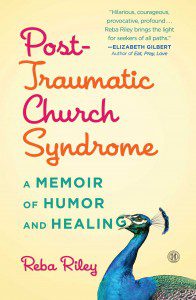 Biblical scholar Walter Brueggemann describes three interconnected moods in the Psalms – psalms of orientation, celebration of the goodness of life and our current blessed personal and social location; psalms of disorientation, lamentations when things fall apart and the future is dim; and new orientation, the joy of healing and recovery, in which things never return to the way they were, but may end up even better than we had previously imagined.
Biblical scholar Walter Brueggemann describes three interconnected moods in the Psalms – psalms of orientation, celebration of the goodness of life and our current blessed personal and social location; psalms of disorientation, lamentations when things fall apart and the future is dim; and new orientation, the joy of healing and recovery, in which things never return to the way they were, but may end up even better than we had previously imagined.
This could be a description of Reba Riley’s “post-traumatic church syndrome.”
Wounded by her early childhood and youthful church experiences, Riley leaves her childhood faith only to be called to explore thirty religious experiences before her thirtieth birthday. She goes on a mystical tour, involving consolation, desolation, rejoicing, grief, and discovery of the divine presence shining through the many spiritual paths she encounters, including those she rejected as an adult.
Along the way, to her surprise, she recovers a sense of vocation. As a youth, a revival preacher identified God’s call for her to be a healer. Ironically, Riley suffered from serious illness that undermined her quality of life. Now almost thirty, she recovers that youthful memory, with all its negative loading, and choses to accept the call even though she must redefine it in new ways. She doesn’t know how her acceptance of her call will manifest, but in accepting the call to be a healer, she also takes the first steps to finally diagnosing and responding to her own personal illness.
Riley’s book reminds us that our unique callings – and I believe we have many callings emerging every day and over the long haul – don’t always come clearly or easily. We may in fact run from them, forget them, or identify them with all that is toxic in our youthful faith. Yet, still we are called; we are lured to horizons of mission and care from a force within yet beyond ourselves.
Could it be that this youthful calling – dare we call it “God-sent” – propelled Riley out of the church, into the spiritual wilderness, and then on a journey through thirty spiritual pathways? Could there have been a voice, deep down in the place where the Spirit speaks “in sighs too deep for words” that was always calling her but hidden by the pain that Riley appropriately felt?
Trauma is devastating. Reminders of traumatic experiences can surface anywhere and at any time. Just a memory or an encounter with something familiar can raise our blood pressure, trouble our minds, and elicit the flight, freeze, or fight response. No one wants to revisit a trauma, but it is possible that within the trauma there is a blessing.
A wise therapist once told me, and this was not sugar-coated counsel, that God would help me find a blessing amid the trouble I was experiencing. God would use the wreckage to create something beautiful for myself and others. That’s the wisdom of Romans 8:28, “in all things God works for good.” Yes, in all things God works for good. Perhaps amid the challenges we face, the voice of the Spirit, who never inflicts pain on us, is working to help us find a way when there is no way. In our weakness, we cry out to God, hoping for an answer, and we may find, as the apostle Paul discovered, that God’s grace is sufficient and that God’s loving power is made perfect in weakness. (2 Corinthians 12:1-10)
God’s call lured Riley on an adventure and it still continues to inspire her pathways. The quest for healing is life-long and perseverance is necessary. Yet, in the wilderness of trauma, there is a quiet energy that calls us forward to our own healing and our own personal calling to share in God’s loving and and healing journey.















